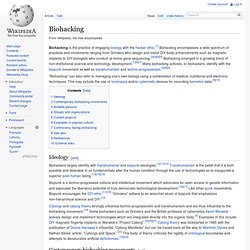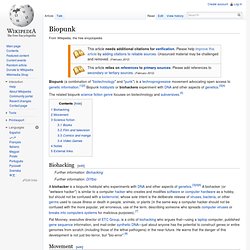

Biohacking. Biohacking is the practice of engaging biology with the hacker ethic.[1] Biohacking encompasses a wide spectrum of practices and movements ranging from Grinders who design and install DIY body-enhancements such as magnetic implants to DIY biologists who conduct at-home gene sequencing.[2][3][4][5] Biohacking emerged in a growing trend of non-institutional science and technology development.[1][6][7] Many biohacking activists, or biohackers, identify with the biopunk movement as well as transhumanism and techno-progressivism.[2][8][9] "Biohacking" can also refer to managing one's own biology using a combination of medical, nutritional and electronic techniques.

This may include the use of nootropics and/or cybernetic devices for recording biometric data.[5][10] Ideology[edit] Contemporary biohacking movements[edit] One of the larger biohacking movements is the DIY biology movement. Bio-hacker. Biopunk. Biopunk (a combination of "biotechnology" and "punk") is a technoprogressive movement advocating open access to genetic information.[1][2] Biopunk hobbyists or biohackers experiment with DNA and other aspects of genetics.[3][4] The related biopunk science fiction genre focuses on biotechnology and subversives.[5] Biohacking[edit] Pat Mooney, executive director of ETC Group, is a critic of biohacking who argues that—using a laptop computer, published gene sequence information, and mail-order synthetic DNA—just about anyone has the potential to construct genes or entire genomes from scratch (including those of the lethal pathogens) in the near-future.

Ellen Jorgensen : le Biohacking.